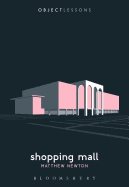
Part of Bloomsbury's Object Lessons series, which highlights the ordinary objects and structures in modern life, Shopping Mall is both history of and paean to the once-ubiquitous American shopping centers. Essayist Matthew Newton combines his fond memories of his local mall, outside Pittsburgh, with anecdotes about the first one built in the United States, the Mall of America and others, using the specific to pull out the larger story of late-20th-century suburban commercialism that these edifices represent.
Renowned Austrian architect Victor Gruen designed the first shopping mall, hoping to emulate the feeling of the bustling city squares in his hometown of Vienna. That Gruen would publicly disavow shopping malls two decades after he built the first one is a testament to how their structures were bent toward the simple functions of materialism, not the community spaces that he had envisioned. Shopping Mall doesn't track much of the metamorphosis between Gruen's plans and the modern iteration, assuming readers can fill in the blanks as to why the architect's utopian vision was ultimately undercut. But, interestingly enough, Newton doesn't entirely agree with Gruen, either. His own experience of the mall gives proof to its importance in community life, both good and bad, and he elucidates this importance through stories of his childhood and retrospectives on how malls are used today. That perspective gives Shopping Mall a much-needed position beyond "malls are perversions of community life through capitalism." He isn't interested in defending shopping malls, but in showing how his--and many other people's--lives would be entirely different without them. --Noah Cruickshank, adult engagement manager, the Field Museum, Chicago, Ill.

